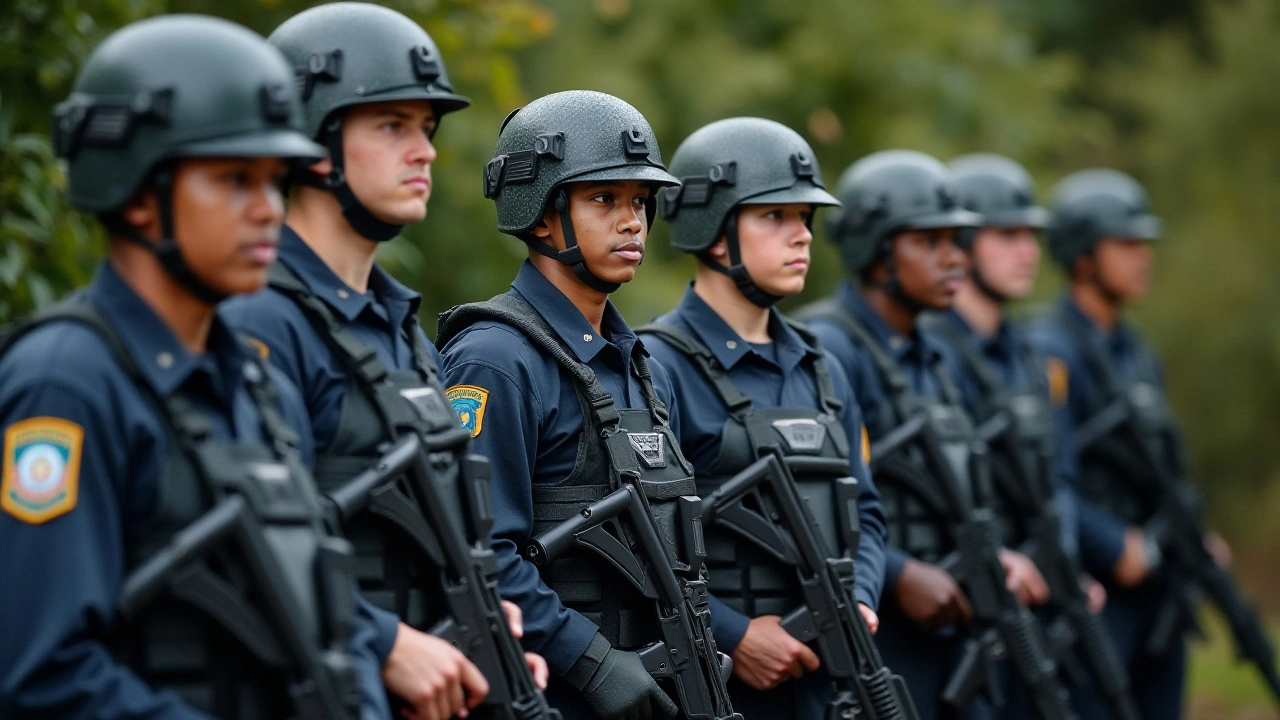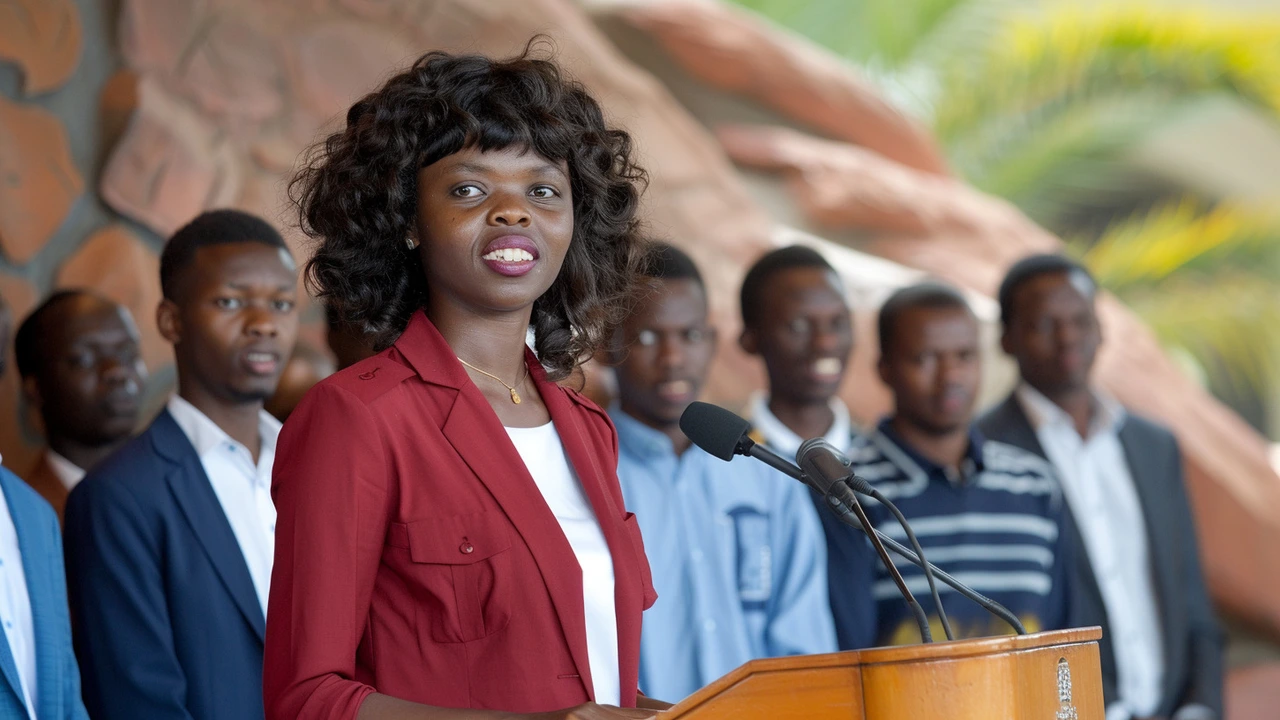Kenyan Police Mission in Haiti: Addressing Allegations
In recent reports, allegations surfaced claiming that nearly 20 officers from the Kenyan-led Multinational Security Support (MSS) mission in Haiti resigned over unpaid salaries and allowances. This news stirred waves of concern and questions about the stability and operational effectiveness of the security mission. However, these claims have been firmly denied by MSS Force Commander Godfrey Otunge, who described the allegations as 'inaccurate and malicious.' Otunge reassured that all personnel deployed in Haiti have received their due salaries and allowances in full. The assertion came as a strong statement to dispel rumors and restore confidence in the mission.
Kenya, a key player in the MSS mission, is actively involved in efforts to stabilize Haiti under a United Nations-approved initiative. The mission was officially launched on June 25, 2024, with an aim to help the Haitian government control rampant gang violence, a significant issue disrupting the peace and safety of the citizens in Haiti. Kenya's Inspector General of Police, Douglas Kanja, confirmed that all officers had indeed been paid up to October, further substantiating Otunge's statement.
Efforts to Stabilize Haiti: An International Collaboration
The multinational efforts in Haiti are part of a broader strategy endorsed by the United Nations, involving contributions from various countries. Currently, the MSS mission has 400 Kenyan personnel deployed, working alongside other international forces to combat the pervasive criminal activities threatening Haitian society. Apart from Kenya's commitment, nations such as Bangladesh, Jamaica, and Barbados are contributing to this comprehensive security initiative.
The involvement of multiple countries is a testament to the urgent need for international assistance in addressing Haiti's complex security challenges. Haitian gangs have gained unprecedented control over territories, including critical areas in the capital, Port-au-Prince. The gangs' dominance impedes the implementation of essential public services and endangers both local citizens and foreign nationals.

Expansion Plans: Increasing Kenya's Role
Recognizing the gravity of the situation, Kenyan President William Ruto has previously announced plans to send an additional 600 officers to the mission. This future deployment will bring Kenya’s total contribution to 1,000 officers, enhancing their role in the comprehensive strategy to restore stability and enforce law and order. This move is seen as a substantial commitment by Kenya, underlying its dedication to international peacekeeping efforts and solidarity with the Haitian people.
The strategic choice to increase the number of personnel aims not only at strengthening the MSS mission’s operations but also at providing relief and security to Haitian communities plagued by violence. There are high expectations for these efforts to foster significant improvements in public safety and enable the government to regain control over gang-dominated territories.
Conclusion: A Unifying Appeal
The allegations of officer resignations over unpaid dues have been firmly refuted, yet they highlight the sensitive nature of operational transparency and trust in international missions. The Kenyan government, through its swift response, aims to reassure not only its citizens but also the international community of its unwavering commitment to the mission in Haiti. Addressing such rumors promptly helps maintain morale, solidarity, and momentum in the ongoing fight against crime in the region.
The collaborative endeavor in Haiti is a reminder of the global interconnectedness in addressing such crises. Ensuring the well-being of personnel and maintaining integrity and transparency in communications are vital components in sustaining the mission's credibility and effectiveness. Through international cooperation and steadfast resolve, there remains hope that peace and normalcy will gradually return to Haiti, providing space for recovery and development.



Crystal Novotny
December 8, 2024 AT 22:55Rumors die faster than gossip.
Reagan Traphagen
December 12, 2024 AT 10:15The so‑called "unpaid salary" story is a classic distraction engineered by hidden forces who want to undermine the Kenyan mission’s credibility. They plant fake resignations, then watch the media scramble for clicks. Every detail matches the playbook of those who profit from chaos. The force commander’s denial is just another layer of the lie. Don’t be fooled by official statements; they’re part of the cover‑up.
mark sweeney
December 15, 2024 AT 21:35Interesting how quickly people latch onto the drama, as if the truth were a novelty item. The numbers are public, the payroll records are audited-yet the rumor mill never sleeps. It’s almost like a game where conspiracists try to out‑wit each other. Maybe the real lesson is that transparency isn’t enough when the audience is primed for scandal.
randy mcgrath
December 19, 2024 AT 08:55It’s easy to get tangled in speculation. The mission’s primary goal is to help Haitians regain safety, and that’s what matters. The facts we have point to a fully paid force. Let’s focus on the outcomes rather than the noise.
Frankie Mobley
December 22, 2024 AT 20:15From a cultural perspective, the Kenyan police have a reputation for dedication. Their involvement in Haiti shows a commitment to global security. It’s encouraging to see multiple nations working together on such a tough challenge.
ashli john
December 26, 2024 AT 07:35Great to see the mission moving forward and the pay issue cleared up It really helps keep morale high and shows that the troops are being taken care of
Kim Chase
December 29, 2024 AT 18:55yeah i think its super important that the troops feel supported. when they're happy they can focus on keeping the streets safe. its a win win for everyone involved.
David Werner
January 2, 2025 AT 06:15Everything looks clean on paper, but behind the curtain there are always hidden agendas. Who benefits when a multinational force appears strong? The real puppeteers stay in the shadows, feeding us narratives that keep us compliant.
Paul KEIL
January 5, 2025 AT 17:35Operational transparency is non‑negotiable; any deviation compounds risk vectors. The mission’s KPI alignment must remain immutable.
Horace Wormely
January 9, 2025 AT 04:55The previous comment contains several grammatical errors: "non‑negotiable" should be hyphenated, and "must remain immutable" is redundant. Clear, precise language is essential for accurate communication.
christine mae cotejo
January 12, 2025 AT 16:15The denial issued by the force commander is a crucial piece of the puzzle, and it deserves a thorough examination. First, acknowledging the seriousness of the rumors shows a proactive stance in crisis communication. Second, the explicit statement that salaries are fully paid up to October counters any speculation about financial mismanagement. Third, this clarification helps maintain the morale of the deployed officers, which is essential for operational effectiveness. Fourth, it reinforces trust with the Haitian government, which relies on a stable security presence. Fifth, the broader international community can view this as a sign of accountability within the mission. Sixth, the denial also serves to dissuade any rogue elements that might seek to exploit perceived weaknesses. Seventh, the timing of the statement aligns with the upcoming expansion of Kenyan forces, which could have been a vulnerable moment. Eighth, the assertion of full payment demonstrates adherence to United Nations standards for peacekeeping operations. Ninth, by directly naming the force commander, the statement adds a personal responsibility layer, which can be reassuring. Tenth, the reference to the Inspector General’s confirmation adds an extra verification point. Eleventh, the consistent messaging across multiple officials eliminates confusion. Twelfth, this transparency can set a precedent for handling future rumors. Thirteenth, it underscores the importance of reliable logistics and financial support in complex deployments. Fourteenth, the clear rebuttal serves as a deterrent against misinformation campaigns. Fifteenth, ultimately, such forthright communication contributes to the overall legitimacy of the mission. Sixteenth, it allows stakeholders to focus on the core goals of stabilizing Haiti rather than being sidetracked by unfounded claims.
Douglas Gnesda
January 16, 2025 AT 03:35Excellent breakdown! Each point highlights why a clear, factual response matters both for the troops on the ground and for the international partners tracking progress. This kind of analysis helps keep the conversation anchored in reality.
Abhijit Pimpale
January 19, 2025 AT 14:55All available payroll data confirms full payment; no anomalies detected. The official statements align with these records.
Eric DE FONDAUMIERE
January 23, 2025 AT 02:15Super excited to see the mission getting the resources it needs! A few typos in the report don’t change the big picture – more officers = more safety.
Pauline Herrin
January 26, 2025 AT 13:35While enthusiasm is welcome, one must remain critical of the long‑term sustainability of such deployments. A formal risk assessment would be prudent.
pradeep kumar
January 30, 2025 AT 00:55These rumors are part of a larger pattern of misinformation aimed at sabotaging peace efforts. Stay vigilant.
love monster
February 2, 2025 AT 12:15Absolutely, staying alert helps us all. Let’s keep supporting the peacekeepers and focus on positive outcomes.
Christian Barthelt
February 5, 2025 AT 23:35Honestly, every time a press release comes out, there’s an undercurrent of doubt. It’s almost as if the truth is inconvenient for the narrative they want to push.
Ify Okocha
February 9, 2025 AT 10:55The constant doubt is a tactic used by those who profit from chaos. By perpetuating uncertainty, they keep the status quo firmly in place.